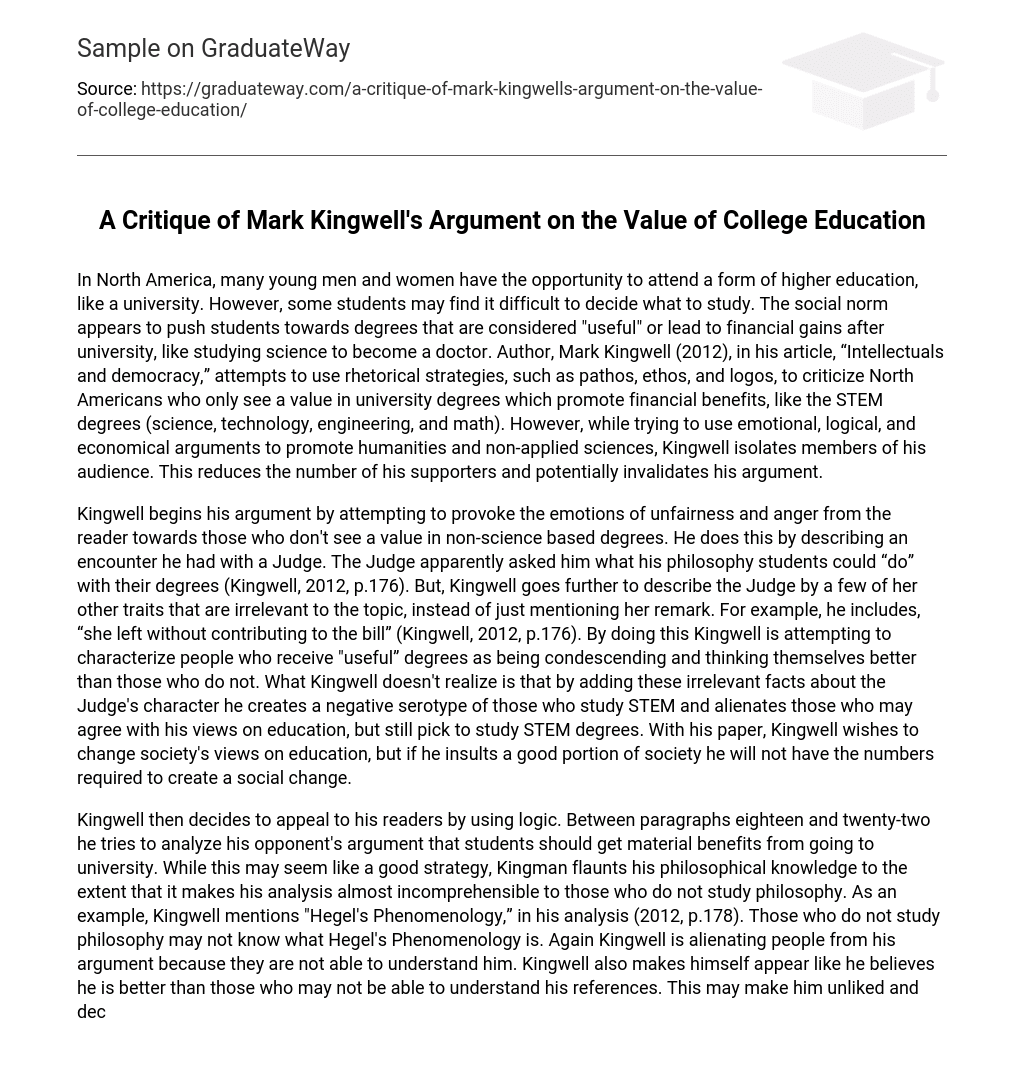Mark Kingwell (2012), in his article “Intellectuals and democracy,” attempts to criticize the social norm in North America where young men and women are pushed towards pursuing degrees in science, technology, engineering, and math (STEM) for financial gains. Kingwell explores the rhetorical strategies of pathos, ethos, and logos to promote humanities and non-applied sciences. However, by isolating his audience and potentially invalidating his argument, Kingwell may limit his supporters.
Kingwell begins his argument by trying to evoke strong emotions of unfairness and anger towards those who fail to see the value in non-science based degrees. To achieve this, he recounts an encounter he had with a Judge who questioned what his philosophy students could “do” with their degrees (Kingwell, 2012, p.176). However, instead of simply mentioning the remark, Kingwell goes on to describe irrelevant traits of the Judge, such as her failure to contribute to the bill (Kingwell, 2012, p.176). His intention is to portray individuals with “useful” degrees as condescending and superior to those who do not possess such degrees. Unbeknownst to Kingwell, this inclusion of irrelevant information about the Judge’s character creates a negative stereotype of STEM students and alienates those who might otherwise agree with his views on education but choose to study STEM subjects. In aiming to reshape society’s perception of education through his paper, Kingwell risks insulting a significant portion of society, thus lacking the numbers needed to effect social change.
Kingwell attempts to appeal to his audience by employing logical reasoning. In paragraphs eighteen to twenty-two, he critically examines his opponent’s argument advocating for material benefits for students attending university. Nevertheless, Kingman’s excessive display of philosophical expertise renders his analysis nearly incomprehensible for non-philosophy students. As a case in point, he references “Hegel’s Phenomenology” in his analysis (2012, p.178), which may be unfamiliar to individuals not well-versed in philosophy. Once again, Kingwell marginalizes his audience by making his argument inaccessible to them. Moreover, he projects an air of superiority towards those who cannot grasp his references, which may result in a decrease in support and a lack of likability. It is rare for individuals to willingly listen to someone who comes across as an arrogant know-it-all.
Finally, Kingwell attempts to assign an economic value to his argument. He concludes his essay by asserting that even though students in humanities and non-applicable science fields may not reap the financial rewards that STEM (Science, Technology, Engineering, and Mathematics) students do, studying these disciplines provides something more valuable than money: a comprehensive understanding of the world. According to Kingwell, the knowledge gained from these degrees contributes to being more informed and engaged citizens (Kingwell, 2012, p.179). This line of reasoning further implies that Kingwell may come across as arrogant and potentially unlikeable. In essence, he replicates what the Judge had done to him. Kingwell undermines the significance of pursuing a degree in a rigorous scientific discipline and implies that those who pursue such degrees are less educated compared to those who pursue humanities degrees. In his endeavor to advocate for the value of his own field, Kingwell inadvertently becomes his own adversary.
In conclusion, Mark Kingwell’s ineffective use of rhetorical devices has resulted in the loss of supporters. By attempting to appeal to the reader’s emotions, Kingwell created a stereotype that alienated potential allies. Additionally, his logical appeal made his argument confusing and possibly disliked. Similarly, his economic appeal made him sound arrogant and undermined the value of STEM degrees, just as the judge devalued non-STEM degrees. To sway the opinions of North Americans, Kingwell must exhibit more compassion towards those who do not pursue humanities and non-applicable sciences. Without majority support, no social change can occur.





